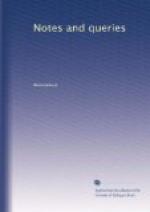DR. MAITLAND’S suggestions are:
1. The collection of a library containing the books particularly required for the objects of the proposed society: and those who have not paid attention to the subject will perhaps be surprised to learn that in DR. MAITLAND’S opinion (and few higher authorities can be found on this point), “A moderate-sized room would hold such a library, and a very few hundred pounds would pay for it.” On the advantage of this plan to the editors of the works to be published by the Society, it can scarcely be necessary to insist; but other benefits would result from the formation of such a library, for which we may refer, however, to the pamphlet itself.
The next points treated of are the works to be undertaken by the Society; which may briefly be described as
2. New and corrected editions of works already known and esteemed; critical editions, for instance, of such well-known writers as Fox, Fuller, Burnet, and Strype: and the completion, by way of “posting up,” of such as have become defective through lapse of time, like Le Neve’s Fasti, Godwin’s De Presulibus, &c.
3. The compilation of such original works as may be considered desiderata. A General Church-History on such a scale, and so far entering into details as to interest a reader, is not to be found in our language; nor has the Church of England any thing like the Gallia Christiana or Italia Sacra. We mention these merely as instances, referring, of course, for further illustration to the pamphlet itself, merely quoting the following paragraph:—
“But on the subject of publication, I must add one thing more, which appeals to me to be of vital importance to the respectability and efficiency of such a Society. It must not build its hopes, and stake its existence, on the cupidity of subscribers—it must not live on appeals to their covetousness—it must not be, nor act as if it were, a joint-stock company formed to undersell the trade. It must not rest on the chance of getting subscribers who will shut their eyes, and open their mouths, and take what is given them, on a mere assurance that it shall be more in quantity for the money, than a bookseller can afford to offer.”
DR. MAITLAND’s fourth section, on the Discovery of Materials, tempts us to further extracts. After remarking that
“It would be a most important and valuable part of the Society’s work to discover in various ways—chiefly by the employing fit persons to look for, inspect, and make known—such materials for Church-History as remain unpublished.”
And
“That no person, not wholly illiterate and ignorant of Church-History, could go about the metropolis only, seeking after such matters during one month, without gathering into his note-book much valuable matter.”
The Doctor proceeds:




